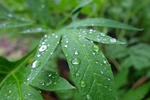2.3 Million Euros for Young Researchers
Direktzugriff
Artikelaktionen
Photo:Marc Thielen
The University of Freiburg and its partners at the Universities of Fribourg (Switzerland) and Cambridge (England) have received a Marie Curie Grant worth 2.3 million euros from the European Commission to fund an Innovative Training Network (ITN) on “Plant-Inspired Materials and Surfaces“ (PlaMatSu). It will enable a total of nine doctoral candidates from all three universities to spend the next four years conducting research for their dissertations in bio-inspired materials sciences and gaining additional practical qualifications. The project collaborators in Freiburg are Prof. Dr. Thomas Speck, Institute of Biology II and Botanical Garden, Prof. Dr. Günter Reiter, Institute of Physics, and Prof. Dr. Jürgen Rühe, Department of Microsystems Engineering. The coordinator of ITN is the chemist Prof. Dr. Nico Bruns from the University of Fribourg’s Adolphe Merkle Institute. The University of Freiburg will receive just under 750,000 euros of the funding.
The research carried out by the nine young scientists will focus on the function and structure of plant cuticles. This external layer of bio-polymers and wax protects leaves and flowers and serves many functions for the plant. It can, for example, use its pores to adjust water permeability and thus regulate water evaporation, the absorption of carbon dioxide, and the release of oxygen. Moreover, its complex surface structure is responsible for a number of other functions at the micrometer and sub-micrometer level, such as self-cleaning. Another aspect of plant surfaces the doctoral candidates will be examining is the regulation of insect adhesion. For example, one and the same insect can move very well along certain organs of a plant species but not along others.
The project PlaMatSu encourages the young researchers to study various types of cuticles and their properties and use them as inspiration for developing new functional materials and surfaces. The doctoral candidates will profit from a network of interdisciplinary laboratories – including chemistry and physics labs as well as biology and materials science labs. In addition, they will receive the opportunity to take practical courses in technology transfer, management, and communication to complement their qualifications in research and development.
University of Fribourg press release
Contact:
Prof. Dr. Thomas Speck
Plant Biomechanics Group
University of Freiburg
Phone: +49 (0)761/203-2875
E-Mail: thomas.speck(at)biologie.uni-freiburg.de
Printable version (pdf) of the press release.
German Press Release
Fußzeile
Benutzerspezifische Werkzeuge

